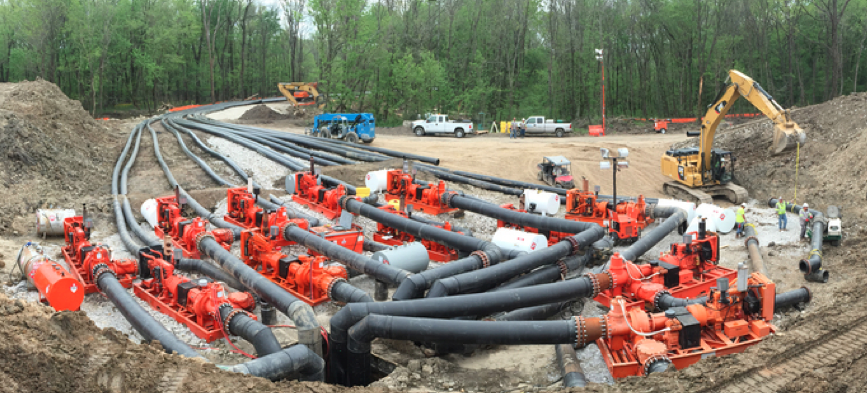In the spring of 2016, an unprecedented 16 inches of rain fell on the city of Memphis, Tennessee. This extraordinary event eroded the soil beneath a critical 96-inch sewer main. When the poor conditions caused the line to fail, the city activated their Emergency Response Plan. Xylem was the city’s first call. And the response was immediate.
For a solid month, it seemed like the rain never stopped. During the month of March 2016, more than 16 inches of rain poured relentlessly on the residents of Memphis, with half of that coming during a two-day deluge. This overwhelming influx of water eroded the soil supporting a sanitary sewer main that carries wastewater to one of the city’s central treatment plants. The line gave way on March 31.
City officials activated an emergency response plan, gathering the management team from the Public Works Division, and bringing in experts from Xylem to assess the damage and map out an action plan.
It was soon decided that an emergency bypass was needed to circumvent the 96-inch sewer main. As part of the Emergency Reponse Plan, Xylem was named the general contractor for the project and charged with providing a turnkey solution to maintain sewer services, minimize the environmental impact and ensure regulatory compliance.
All hands on deck
With no time to lose, Xylem set up around-the-clock teams, consisting of more than 30 Xylem staff, supported by 100 Memphis Public Works and 60 contractor personnel. The all-hands-on-deck approach enabled the Xylem-led team to get the work done in a fraction of the time normally required for a solution of this magnitude.
“Xylem was able to marshal the equipment, the pumps and whatever else was needed to get the job done,” said Paul Patterson, Environmental Engineering Administrator for the City of Memphis. “They had the resources, number one, and they had people who understood and knew how to utilize those resources. Public Works had the manpower, we had good employees that were willing to work, and we had equipment as well. So all of that put together resulted in a very successful response.”

VIDEO: See how Xylem built the bypass for Memphis
The bypass needed to handle 160 million gallons per day (MGD) of flow and traverse approximately 2,400 linear feet from the suction point to the discharge location. Before any water could be pumped, a number of “critical path” projects had to be executed, from creating a right-of-way for the bypass to shoring up 250 feet of embankment where the pumps would be positioned.
Pumps in place in record time
To handle the peak flow of 160 MGD, Xylem deployed 14 Godwin diesel-driven Dri-Prime CD400M pumps. Six days after the break, five of the pumps were operational and handling 50 MGD of flow – the normal average daily flow rate for the system.
“The project as a whole was amazing,” said Mike Leonard, Xylem’s Branch Manager. “Everybody worked together, working 16- and 18-hour shifts. It was just a total job put together, from the city to the contractors to Xylem, that just worked as a whole. Everyone jumped right in to help – to help Memphis.”
Xylem shipped in 30,000 feet of piping from its east coast rental locations and brought in a dozen trained and certified Xylem fusion techs. Working non-stop for a week, the teams fused together 50-foot pieces of pipe into 500-foot sections that were then moved into place along the 2,400 foot right-of-way.
A secondary bypass was also installed to ensure minimal impact on the structure and, once all the pumps were online, Xylem switched over to 24/7 bypass operating mode. Two teams of on-site Xylem mechanics worked alternating 12-hour shifts to operate, monitor, service and repair the pumps and turn them on and off as flow fluctuated.
Successful outcome
The bypass system worked exactly as planned, pumping some 60 to 160 MGD of raw sewage daily.
Xylem overcame major obstacles to deliver a turnkey bypass solution to Memphis in a remarkably short period of time. Working around the clock and utilizing more than 20 pieces of heavy machinery, the Xylem-led team installed 18 pumps, nearly six miles of HDPE pipe and the necessary accessories – all in just two weeks.
“One of the benefits of having the turnkey solution on a project such as this is it allowed the city to focus on the design and the construction of the replacement line once the bypass had been established,” Patterson says. “Xylem was going to design, implement and maintain the bypass, so we were able to focus our resources and our efforts entirely on design and construction and getting the pipe replaced. And that was key.”

